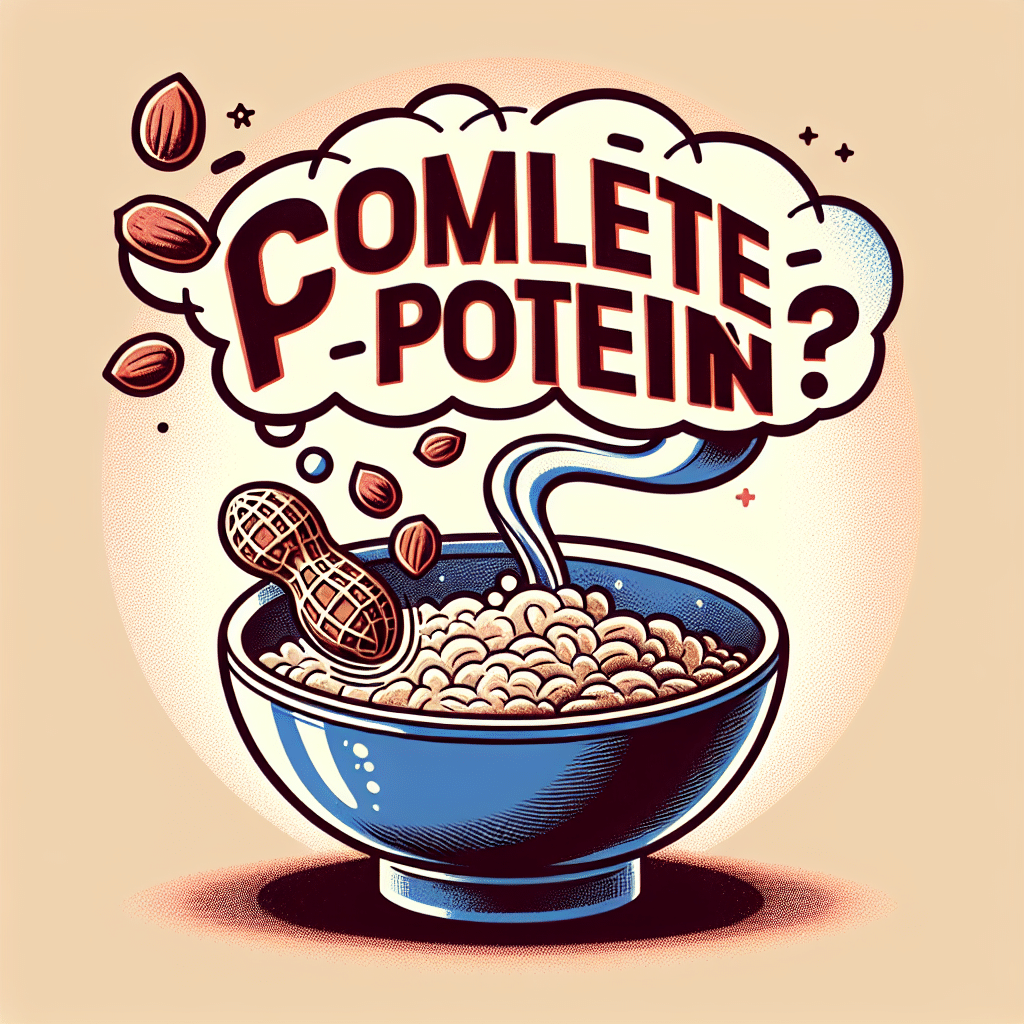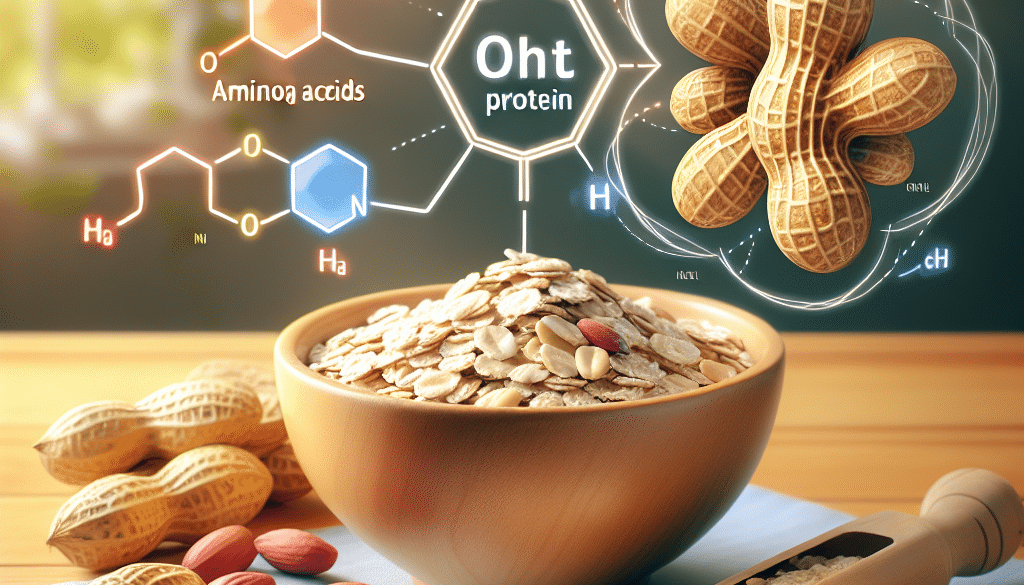Do Peanuts And Oatmeal Make A Complete Protein?
-
Table of Contents
- Complete Protein Combos: Are Peanuts and Oatmeal the Answer?
- Understanding Complete Proteins
- The Nutritional Profile of Peanuts and Oatmeal
- Combining Peanuts and Oatmeal for Protein Quality
- Scientific Evidence on Protein Complementation
- Benefits of Plant-Based Proteins
- Practical Tips for Including Peanuts and Oatmeal in Your Diet
- Case Studies and Statistics
- Conclusion: The Synergy of Peanuts and Oatmeal
- Discover ETprotein’s High-Quality Protein Products
Complete Protein Combos: Are Peanuts and Oatmeal the Answer?

When it comes to nutrition, protein is a critical macronutrient that plays a vital role in building and repairing tissues, making enzymes and hormones, and supporting overall health. However, not all protein sources are created equal. Amino acids, the building blocks of protein, come in various forms, and a “complete protein” contains all nine essential amino acids that our bodies cannot produce on their own. This article explores whether combining peanuts and oatmeal can create a complete protein, offering a nutritious solution for those seeking plant-based dietary options.
Understanding Complete Proteins
Proteins are made up of amino acids, of which there are twenty. Nine of these are essential, meaning our bodies cannot synthesize them, and they must be obtained through our diet. A complete protein source contains an adequate proportion of these nine essential amino acids. Animal products, such as meat, dairy, and eggs, typically contain all the essential amino acids, making them complete proteins. However, most plant-based proteins lack one or more essential amino acids, making them incomplete proteins.
The Nutritional Profile of Peanuts and Oatmeal
Peanuts are a legume with a strong nutritional profile. They are rich in protein, healthy fats, vitamins, and minerals. However, peanuts are low in the amino acid methionine. On the other hand, oatmeal is a whole grain that provides a good amount of protein for a cereal, along with fiber and various vitamins and minerals. Oatmeal is low in the essential amino acids lysine and threonine.
Combining Peanuts and Oatmeal for Protein Quality
By combining foods that are low in different essential amino acids, it is possible to create a meal that provides complete protein. This is known as protein complementation. When you eat peanuts with oatmeal, the methionine that oatmeal lacks is made up for by the peanuts, and the lysine and threonine that peanuts lack are provided by the oatmeal. This combination can, therefore, result in a meal that is closer to providing complete protein.
- Peanuts: High in protein, healthy fats, and other nutrients but low in methionine.
- Oatmeal: Provides a decent amount of protein for a grain and is rich in fiber but low in lysine and threonine.
Scientific Evidence on Protein Complementation
Research has shown that consuming a variety of plant-based proteins throughout the day can meet a person’s amino acid needs without the necessity of carefully combining proteins at every meal. The body maintains a pool of amino acids that can be used to complement dietary proteins. This means that as long as a person consumes all essential amino acids in sufficient quantities over the course of a day, they can achieve a balanced amino acid intake.
Benefits of Plant-Based Proteins
There are several benefits to consuming plant-based proteins like peanuts and oatmeal, including:
- Lower risk of heart disease
- Improved weight management
- Reduced carbon footprint
- Increased dietary fiber intake
Moreover, for those with dietary restrictions or ethical concerns regarding animal products, plant-based proteins offer a viable alternative.
Practical Tips for Including Peanuts and Oatmeal in Your Diet
Here are some practical ways to include peanuts and oatmeal in your diet to enhance protein quality:
- Start your day with a bowl of oatmeal topped with a spoonful of peanut butter.
- Snack on a handful of peanuts alongside a serving of oat-based granola bars.
- Prepare savory oatmeal dishes with crushed peanuts for added texture and nutrition.
Case Studies and Statistics
While specific case studies on the combination of peanuts and oatmeal are limited, numerous studies support the health benefits of plant-based diets. For instance, a study published in the Journal of the American Heart Association found that higher intake of plant proteins was associated with lower rates of death related to cardiovascular disease.
Conclusion: The Synergy of Peanuts and Oatmeal
In conclusion, while peanuts and oatmeal on their own are not complete proteins, their combination can help provide a broader range of essential amino acids. This synergy makes them a powerful duo for those looking to enhance the quality of plant-based proteins in their diet. By understanding the principles of protein complementation and incorporating a variety of plant-based proteins throughout the day, individuals can meet their nutritional needs while enjoying the health benefits associated with plant-based eating.
Discover ETprotein’s High-Quality Protein Products
If you’re looking to supplement your diet with high-quality protein products, consider exploring ETprotein’s offerings. Their range of organic bulk vegan proteins, including peanut protein, is designed to cater to various dietary needs and preferences. With a commitment to non-GMO, allergen-free ingredients, and high purity levels, ETprotein is a trusted source for your protein supplementation needs.
About ETprotein:
ETprotein, a reputable protein and L-(+)-Ergothioneine (EGT) Chinese factory manufacturer and supplier, is renowned for producing, stocking, exporting, and delivering the highest quality organic bulk vegan proteins and L-(+)-Ergothioneine. They include Organic rice protein, clear rice protein, pea protein, clear pea protein, watermelon seed protein, pumpkin seed protein, sunflower seed protein, mung bean protein, peanut protein, and L-(+)-Ergothioneine EGT Pharmaceutical grade, L-(+)-Ergothioneine EGT food grade, L-(+)-Ergothioneine EGT cosmetic grade, L-(+)-Ergothioneine EGT reference grade and L-(+)-Ergothioneine EGT standard. Their offerings, characterized by a neutral taste, non-GMO, allergen-free attributes, with L-(+)-Ergothioneine purity over 98%, 99%, cater to a diverse range of industries. They serve nutraceutical, pharmaceutical, cosmeceutical, veterinary, as well as food and beverage finished product distributors, traders, and manufacturers across Europe, USA, Canada, Australia, Thailand, Japan, Korea, Brazil, and Chile, among others.
ETprotein specialization includes exporting and delivering tailor-made protein powder and finished nutritional supplements. Their extensive product range covers sectors like Food and Beverage, Sports Nutrition, Weight Management, Dietary Supplements, Health and Wellness Products, and Infant Formula, ensuring comprehensive solutions to meet all your protein needs.
As a trusted company by leading global food and beverage brands and Fortune 500 companies, ETprotein reinforces China’s reputation in the global arena. For more information or to sample their products, please contact them and email sales(at)ETprotein.com today.














